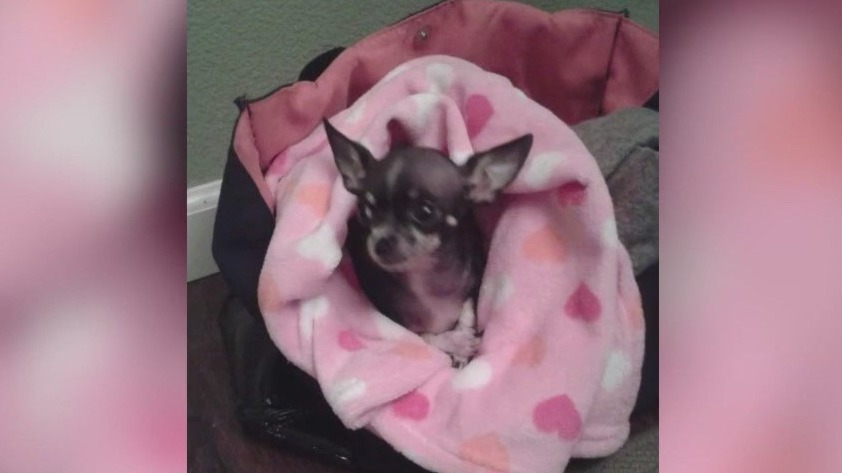San Pablo woman believes her service dog died of infectious mystery respiratory illness

Bay Area dogs impacted by mysterious respiratory illness
A woman shares the story of her 12-year-old service dog who died this week due to a mysterious illness. KTVU's Crystal Bailey reports.
CONTRA COSTA COUNTY, Calif. - Veterinarians are monitoring a rise in a mysterious respiratory illness that’s plaguing dogs at vet clinics and animal shelters all over the country.
One San Pablo woman said her service dog died this week, and she believes the mystery illness is to blame. Now, she warns other pet owners to be on the lookout.
Tina Marie Silva said one of her service dogs, a 12-year-old Chihuahua named Cookie Monster, started acting strange earlier this week.
"She was sneezing a lot, and she would wake up, and it was the cutest sneeze. She was trying to blow her nose out," said Silva. "She stopped walking normally."
Silva said the dog became sluggish and said the symptoms got worse and within a couple of days, "She passed away with her eyes wide open."
Silva thinks it was the mysterious respiratory illness affecting dogs, but vets are having a hard time confirming cases.
"It’s really tough because there’s not a hallmark sign that says it’s this one, we’ve really got to figure it out with the case individually," said Dr. Michael Hyder, a veterinarian with Veterinary Emergency Group. He said the symptoms mirror many other respiratory illnesses in dogs, but existing treatments don't seem to tackle the disease.
The cases are identified by "chronic mild-moderate respiratory symptoms like pneumonia for 6-8 weeks that is not responsive to antibiotics" or "acute pneumonia that rapidly becomes severe and often leads to poor outcomes in as little as 24-36 hours," according to health officials.
The Milo Foundation shared it was forced to close their adoption center in Richmond due to an outbreak of respiratory illness in their animals.
"Unfortunately we have experienced exposure to infectious illness and have closed the Milo Point Richmond Adoption Center for deep cleaning, and will inform you when we are able to reopen. We apologize for any inconvenience," the animal shelter posted on Facebook.
A worker at Milo’s said they’re not sure whether it was the mystery illness or something else, but they plan to re-open to the public soon.
"Knock on wood, we’re pretty lucky at this moment that we don’t have it here," said Leslie Riley, a manager at Jelly’s Place in San Pablo.
Riley said Jelly's Place is taking precautions each time they get a new pet to avoid a spread.
"We will quarantine it for about 10 – 14 days to make sure that they don’t have any symptoms of anything," said Riley.
Vets in Contra Costa County said there have not been any confirmed cases, but they suspect it’s out there.
"Right now we have to treat them all like it could be, and we work them up diligently and see how they respond to treatment," said Dr. Hyder.
Now Silva is worried her second dog, Tahoe, also has it.
"He doesn’t look the same. It’s not the same smile. It’s not the same breathing," she said, confirming she is planning to take Tahoe to see a doctor.
She warns others to keep an eye on their dogs if they start developing symptoms. "Don’t overlook it."
Dr. Hyder said, "Watch your dog closely and if they show any signs like coughing, nasal discharge, changes in breathing patterns, or sometimes even broad things like loss of appetite or energy levels, well follow up with your vet immediately to get them checked out."
The Los Angeles County Department of Public Health released information about an outbreak in the San Fernando Valley where several dogs with a cough and pneumonia were not responsive to treatment, two of which died. So far during outbreaks, there is no evidence that it spreads between species or to humans.
"The American Veterinary Medical Association is monitoring reports of canine respiratory illness in many states. Illness has been reported, either officially or anecdotally, in the states of Oregon, Colorado, California, Illinois, Florida, Georgia, Indiana, Massachusetts, Washington, Vermont, Maryland, Idaho, New Hampshire, and Rhode Island," said Dr. Rena Carlson, President of the American Veterinary Medical Association (AVMA).
Currently, the AVMA reports the infectious agent is not known but is under investigation.
Although there is no vaccine for this mystery respiratory illness, officials said you should keep your dog healthy and fully vaccinated, especially if you decide to board your dog or frequent dog parks.
Officials also warn if your dog is presenting symptoms, don’t take them to dog parks, grooming facilities, or boarding kennels. Isolate any sick animals for 28 days and exposed animals for at least 14 days while frequently disinfecting surfaces.

